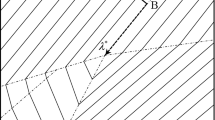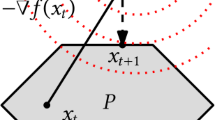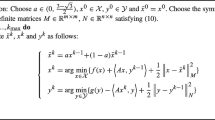Abstract
This paper describes three recent tools for dealing with primal degeneracy in linear programming. The first one is the improved primal simplex (IPS) algorithm which turns degeneracy into a possible advantage. The constraints of the original problem are dynamically partitioned based on the numerical values of the current basic variables. The idea is to work only with those constraints that correspond to nondegenerate basic variables. This leads to a row-reduced problem which decreases the size of the current working basis. The main feature of IPS is that it provides a nondegenerate pivot at every iteration of the solution process until optimality is reached. To achieve such a result, a negative reduced cost convex combination of the variables at their bounds is selected, if any. This pricing step provides a necessary and sufficient optimality condition for linear programming. The second tool is the dynamic constraint aggregation (DCA), a constructive strategy specifically designed for set partitioning constraints. It heuristically aims to achieve the properties provided by the IPS methodology. We bridge the similarities and differences of IPS and DCA on set partitioning models. The final tool is the positive edge (PE) rule. It capitalizes on the compatibility definition to determine the status of a column vector and the associated variable during the reduced cost computation. Within IPS, the selection of a compatible variable to enter the basis ensures a nondegenerate pivot, hence PE permits a trade-off between strict improvement and high, reduced cost degenerate pivots. This added value is obtained without explicitly computing the updated column components in the simplex tableau. Ultimately, we establish tight bonds between these three tools by going back to the linear algebra framework from which emanates the so-called concept of subspace basis.







Similar content being viewed by others
References
Ahuja RK, Magnanti TL, Orlin JB (1993) Network flows: theory, algorithms, and applications. Upper Saddle River, New York
Barnhart C, Johnson EL, Nemhauser GL, Savelsbergh MWP, Vance PH (1998) Branch-and-price: column generation for solving huge integer programs. Oper Res 46(3):316–329. doi:10.1287/opre.46.3.316
Ben Amor HMT, Desrosiers J, Frangioni A (2009) On the choice of explicit stabilizing terms in column generation. Discret Appl Math 157(6):1167–1184. doi:10.1016/j.dam.2008.06.021
Benchimol P, Desaulniers G, Desrosiers J (2012) Stabilized dynamic constraint aggregation for solving set partitioning problems. Eur J Oper Res 223(2):360–371. doi:10.1016/j.ejor.2012.07.004
Bland RG (1977) New finite pivoting rules for the simplex method. Math Oper Res 2(2):103–107. doi:10.1287/moor.2.2.103
Valério de Carvalho JM (1999) Exact solution of bin-packing problems using column generation and branch-and-bound. Ann Oper Res 86:629–659. doi:10.1023/A:1018952112615
Valério de Carvalho JM (2002) LP models for bin-packing and cutting stock problems. Eur J Oper Res 141(2):253–273. doi:10.1016/S0377-2217(02)00124-8
Charnes A (1952) Optimality and degeneracy in linear programming. Econometrica 20(2):160–170. doi:10.2307/1907845
Dantzig GB (1963) Linear programming and extensions. Princeton University Press, Princeton
Dantzig GB, Wolfe P (1960) Decomposition principle for linear programs. Oper Res 8(1):101–111. doi:10.1287/opre.8.1.101
Desaulniers G, Desrosiers J, Ioachim I, Solomon MM, Soumis F, Villeneuve D (1998) A unified framework for deterministic time constrained vehicle routing and crew scheduling problems. In: Crainic T, Laporte G (eds) Fleet management and logistics. Springer, New York pp 57–93. doi:10.1007/978-1-4615-5755-5_3
Desrosiers J, Lübbecke ME (2011) Branch-price-and-cut algorithms. Wiley, New York. doi:10.1002/9780470400531.eorms0118
Desrosiers J, Dumas Y, Solomon MM, Soumis F (1995) Time constrained routing and scheduling. In: Ball M, Magnanti T, Monma C, Nemhauser G (eds) Handbooks in operations research and management science, Network routing, vol 8. Elsevier, New York, pp 35–139. doi:10.1016/S0927-0507(05)80106-9
Desrosiers J, Gauthier JB, Lübbecke ME (2013) A contraction-expansion algorithm for the capacitated minimum cost flow problem. Presentation at VeRoLog 2013, Southampton
Desrosiers J, Gauthier JB, Lübbecke ME (2014) Row-reduced column generation for degenerate master problems. Eur J Oper Res 236(2):453–460. doi:10.1016/j.ejor.2013.12.016
du Merle O, Villeneuve D, Desrosiers J, Hansen P (1999) Stabilized column generation. Discret Math 194:229–237. doi:10.1016/S0012-365X(98)00213-1
Elhallaoui I, Villeneuve D, Soumis F, Desaulniers G (2005) Dynamic aggregation of set partitioning constraints in column generation. Oper Res 53(4):632–645. doi:10.1287/opre.1050.0222
Elhallaoui I, Desaulniers G, Metrane A, Soumis F (2008) Bi-dynamic constraint aggregation and subproblem reduction. Comput Oper Res 35(5):1713–1724. doi:10.1016/j.cor.2006.10.007
Elhallaoui I, Metrane A, Soumis F, Desaulniers G (2010) Multi-phase dynamic constraint aggregation for set partitioning type problems. Math Progr 123(2):345–370. doi:10.1007/s10107-008-0254-5
Elhallaoui I, Metrane A, Desaulniers G, Soumis F (2011) An improved primal simplex algorithm for degenerate linear programs. INFORMS J Comput 23:569–577. doi:10.1287/ijoc.1100.0425
Fukuda K (1982) Oriented matroid programming. PhD thesis, University of Waterloo, Ontario, Canada
Gauthier JB, Desrosiers J, Lübbecke ME (2014) About the minimum mean cycle-canceling algorithm. Discret Appl Math. doi:10.1016/j.dam.2014.07.005
Goldberg AV, Tarjan RE (1989) Finding minimum-cost circulations by canceling negative cycles. J ACM 36(4):873–886. doi:10.1145/76359.76368
Haase K, Desaulniers G, Desrosiers J (2001) Simultaneous vehicle and crew scheduling in urban mass transit systems. Transp Sci 35(3):286–303. doi:10.1287/trsc.35.3.286.10153
Harris PMJ (1973) Pivot selection methods of the devex lp code. Math Progr 5(1):1–28. doi:10.1007/BF01580108
Karp RM (1978) A characterization of the minimum cycle mean in a digraph. Discret Math 23(3):309–311. doi:10.1016/0012-365X(78)90011-0
Klee V, Minty G (1972) How good is the simplex algorithm? In: Shisha O (ed) Inequalities, (Proc. Third Sympos., Univ. California, Los Angeles, Calif., 1969; dedicated to the memory of Theodore S. Motzkin), vol 3. Academic Press, New York, pp 159–175
Koch T, Achterberg T, Andersen E, Bastert O, Berthold T, Bixby RE, Danna E, Gamrath G, Gleixner AM, Heinz S, Lodi A, Mittelmann H, Ralphs T, Salvagnin D, Steffy DE, Wolter K (2011) MIPLIB 2010. Math Progr Comput 3(2):103–163. doi:10.1007/s12532-011-0025-9
Löbel A (1998) Vehicle scheduling in public transit and Lagrangean pricing. Manag Sci 44(12):1637–1649. doi:10.1287/mnsc.44.12.1637
Lübbecke ME, Desrosiers J (2005) Selected topics in column generation. Oper Res 53(6):1007–1023. doi:10.1287/opre.1050.0234
Mamer JW, McBride RD (2000) A decomposition-based pricing procedure for large-scale linear programs: an application to the linear multicommodity flow problem. Manag Sci 46(5):693–709. doi:10.1287/mnsc.46.5.693.12042
Metrane A, Soumis F, Elhallaoui I (2010) Column generation decomposition with the degenerate constraints in the subproblem. Eur J Oper Res 207(1):37–44. doi:10.1016/j.ejor.2010.05.002
Omer J, Rosat S, Raymond V, Soumis F (2014) Improved primal simplex: a more general theoretical framework and an extended experimental analysis. Les Cahiers du GERAD G-2014-13, HEC Montréal, Canada
Oukil A, Ben Amor HMT (2007) Stabilized column generation for highly degenerate multiple-depot vehicle scheduling problems. Comput Oper Res 34(3):817–834. doi:10.1016/j.cor.2005.05.011
Pan PQ (1998) A basis deficiency-allowing variation of the simplex method for linear programming. Comput Math Appl 36(3):33–53. doi:10.1016/S0898-1221(98)00127-8
Perold AF (1980) A degeneracy exploiting LU factorization for the simplex method. Math Progr 19(1):239–254. doi:10.1007/BF01581646
Radzik T, Goldberg AV (1994) Tight bounds on the number of minimum-mean cycle cancellations and related results. Algorithmica 11(3):226–242. doi:10.1007/BF01240734
Raymond V, Soumis F, Metrane A (2009) Improved primal simplex version 3: cold start, generalization for bounded variable problems and a new implementation. Les Cahiers du GERAD G-2009-15, HEC Montréal, Canada
Raymond V, Soumis F, Metrane A, Desrosiers J (2010a) Positive edge: a pricing criterion for the identification of non-degenerate simplex pivots. Les Cahiers du GERAD G-2010-61, HEC Montréal, Canada
Raymond V, Soumis F, Orban D (2010b) A new version of the improved primal simplex for degenerate linear programs. Comput Oper Res 37(1):91–98. doi:10.1016/j.cor.2009.03.020
Rosat S, Elhallaoui I, Soumis F, Lodi A (2014) Integral simplex using decomposition with primal cuts. In: Gudmundsson J, Katajainen J (eds) Experimental algorithms, Lecture notes in computer science, vol 8504. Springer, New York, International Publishing, pp 22–33. doi:10.1007/978-3-319-07959-2_3
Ryan DM, Osborne MR (1988) On the solution of highly degenerate linear programmes. Math Progr 41(1–3):385–392. doi:10.1007/BF01580776
Sadykov R, Vanderbeck F (2013) Column generation for extended formulations. EURO J Comput Optim 1(1–2):81–115. doi:10.1007/s13675-013-0009-9
Schrijver A (1986) Theory of Linear and Integer Programming. Wiley, Chichester
Terlaky T, Zhang S (1993) Pivot rules for linear programming: a survey on recent theoretical developments. Annal Oper Res Anna OR 46–47(1):203–233. doi:10.1007/BF02096264
Towhidi M, Desrosiers J, Soumis F (2014) The positive edge criterion within COIN-OR’s CLP. Comput Oper Res 49:41–46. doi:10.1016/j.cor.2014.03.020
Wolfe P (1963) A technique for resolving degeneracy in linear programming. J Soc Ind Appl Math 11(2):205–211. doi:10.1137/0111016
Zaghrouti A, Soumis F, El Hallaoui I (2014) Integral simplex using decomposition for the set partitioning problem. Oper Res 62(2):435–449. doi:10.1287/opre.2013.1247
Acknowledgments
Jacques Desrosiers acknowledges the Natural Sciences and Engineering Research Council of Canada for its financial support.
Author information
Authors and Affiliations
Corresponding author
Rights and permissions
About this article
Cite this article
Gauthier, J.B., Desrosiers, J. & Lübbecke, M.E. Tools for primal degenerate linear programs: IPS, DCA, and PE. EURO J Transp Logist 5, 161–204 (2016). https://doi.org/10.1007/s13676-015-0077-5
Received:
Accepted:
Published:
Issue Date:
DOI: https://doi.org/10.1007/s13676-015-0077-5




